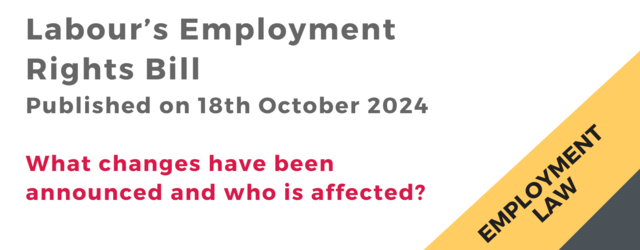
Employment Law Changes for Employers: Key Updates for 2025 and What’s Coming in 2026
Stay compliant with UK Employment Law changes. Discover 2025 reforms and changes coming in to force in 2026, including flexible working, fire-and-rehire restrictions, ACAS conciliation, and more. Our Employment Law experts in Sheffield, Chesterfield and Mansfield will provide the most up-to-date advice and help you implement the latest employment law changes to keep your business compliant.

Employment Law Changes in 2024 and What Employers Can Expect for 2025
The UK employment law landscape has undergone significant changes in 2024, and more updates are on the horizon for 2025 and beyond. These reforms impact employers, demanding careful consideration by them to ensure they are legally compliant and ensuring they are following best practice.

Labour’s Employment Rights Bill: What changes have been announced and who is affected?
The Labour government’s new Employment Rights Bill (published on 18th October 2024) introduces significant changes that aim to improve job security, expand worker protections, and increase flexibility for millions of employees across the UK. Katie Ash, Head of Employment Law at Banner Jones, breaks down some of the key changes and explains who will be affected.

Navigating the recent changes in UK Employment Laws - April 2024
For HR managers and businesses alike, keeping abreast of Employment Law changes isn't just advisable—it's imperative. Here, Katie Ash, Head of Employment Law summarises some recent regulation changes which came into effect in April 2024.

Improved Redundancy Protection for Maternity Leave
New Regulations came into force on 6 April 2024 in England and Wales to give pregnant employees and those on maternity leave or family-related leave better protection from redundancy.

How to calculate holiday pay in 2024: an update on legislative changes
For many businesses, calculating holiday pay is a straight-forward process. Employers are, within the parameters of the law, able to dictate how many annual leave days or hours a staff member is entitled to.

What is Carer's Leave?
Carer's Leave is where employees apply to be absent from work to provide or arrange care for a dependant with a long-term care need.

Changes to statutory Paternity Leave come into force
The Paternity Leave (Amendment) Regulations 2024 have now come into force, bringing with them changes which see fathers or partners of children born or adopted after 6th April 2024 being able to take their paternity leave entitlement in 2 blocks of one week within the first year of the birth or adoption of their child.

Positive Action not Positive Discrimination
People often talk about how certain groups are under-represented within workforces, but what steps can an employer take to redress this? Head of Employment Law at Banner Jones Solicitors, Katie Ash, discusses how employers can use a Positive Action approach to eliminate or reduce discrimination and help these groups access employment or training as outlined in the Equality Act 2010.

Selling a Business - A Complete Guide
There are many factors to consider when selling a business and it isn’t something that should be entered into lightly. Our free guide runs through some of the important considerations this involves.

Business Legal Services Team
Our Business Legal Services team pride themselves on being able to offer high quality ‘city style’ advice in a user friendly, cost effective manner to local, national and international businesses.

Menopause in the Workplace: What Employers Need to Know
Learn how employers can support staff through menopause and avoid legal risks. Expert advice from Banner Jones’ employment law solicitors in Chesterfield, Sheffield, Mansfield and Dronfield.

Business First Magazine Spring 23
In this issue we cover lots of topical business issues and challenges from Mergers, Layoffs, Going Global, Commercial Property and more

The importance of reviewing & understanding contracts of employment
Employment relationships in the modern working world are vast and varied: from workers, to employees, to consultants, to freelancers. On top of this, businesses operate at all times of day and night, many internationally, and following Covid-19, there is an ever-increasing ability for many individuals to work anywhere in the world.

Settlement Agreement Advice
Katie Ash explains and answers some questions about settlement agreements.

Why businesses should embrace the Employment Bill changes
Workers’ rights have long since been protected by law… to an extent. However, in 2019 the Conservative government promised to introduce a unified Employment Bill which would hold British businesses accountable across the board.

How to avoid an Employment Tribunal
The cost of defending Employment Tribunal cases can vary significantly and could cost your business anything from £10,000 to £50,000. Then if the claimant is successful, there will be the cost of compensation on top of this. The average award for an unfair dismissal case in the UK is a little under £7,000, with claims resulting from discrimination costing significantly more. Businesses also need to consider the hidden cost of employment law claims caused by the damage it can do to their reputation as an employer and as a business that clients and customers want to work with. Often this cost can be more damaging than the award itself.
.

Gender Pay Gap Reporting: Your Questions Answered
Over time, the gap between women’s and men’s median hourly earnings has been narrowing. In fact, according to the Office for National Statistics (ONS) it has fallen by over a quarter among full-time employees in the last decade.

GDPR – TIPS FOR EMPLOYEES
Complying with GDPR is the responsibility of every employee so we’ve written some tips on how you can help your business stay compliant.

Online Privacy in the Office
Companies are within their rights to monitor the private online activities of their employees when they are in the office.





